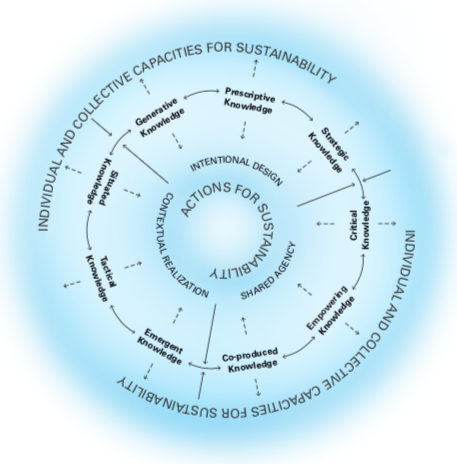What is #action-oriented #knowledge for #sustainability?
In our paper in @naturesustainab from @SpringerNature we use #Philosophy and #theory to clarify the knowledge we need to support #ClimateAction https://abs.twimg.com/hashflags... draggable="false" alt=""> to achieve #sustainability and the #SDGs.
https://abs.twimg.com/hashflags... draggable="false" alt=""> to achieve #sustainability and the #SDGs.
https://rdcu.be/b76hG ">https://rdcu.be/b76hG&quo...
In our paper in @naturesustainab from @SpringerNature we use #Philosophy and #theory to clarify the knowledge we need to support #ClimateAction
https://rdcu.be/b76hG ">https://rdcu.be/b76hG&quo...
This work is motivated by two frustrations: (1)Despite the good intentions, most knowledge from #academia does not inform actions for #sustainability; (2)Sustainability science still lacks systematic approaches to understand #knowledge for #sustainability and for #ClimateAction  https://abs.twimg.com/hashflags... draggable="false" alt="">.
https://abs.twimg.com/hashflags... draggable="false" alt="">.
To address these frustrations, I embarked in a collaboration with an incredible and very patient  https://abs.twimg.com/emoji/v2/... draggable="false" alt="🥰" title="Smiling face with 3 hearts" aria-label="Emoji: Smiling face with 3 hearts"> group of co-authors: @CLuederitz, T. von Wirth, @IFazey, B. Martin-Lopez, K. Hondrilla, A. König, N. Schäpke, @mlaubic, @SustainableDean, and @hengenlang.
https://abs.twimg.com/emoji/v2/... draggable="false" alt="🥰" title="Smiling face with 3 hearts" aria-label="Emoji: Smiling face with 3 hearts"> group of co-authors: @CLuederitz, T. von Wirth, @IFazey, B. Martin-Lopez, K. Hondrilla, A. König, N. Schäpke, @mlaubic, @SustainableDean, and @hengenlang.
In the paper, we suggest to take two conceptual turns. We do so based mainly on insights from #pragmatism, #HPLS, #environmentalethics, #EnvironmentalJustice, #postnormal science, #interdisciplinarity, and #transdisciplinarity.
First turn: If we want to understand action-oriented knowledge for sustainability, we should not start by talking about knowledge. We have to first clarify what we mean by actions for #sustainability, such as #ClimateAction  https://abs.twimg.com/hashflags... draggable="false" alt="">.
https://abs.twimg.com/hashflags... draggable="false" alt="">.
We suggest that actions for sustainability are three dimensional and emergent processes that (1) are designed with the #intention to create #change; (2) require shared #agency of multiple actors; (3) are realised in complex and evolving social-ecological contexts.
Examples of actions for sustainability are:initiatives of #IndigenousPeoples seeking to restore the social-ecological #integrity of their own land; #adaptation and #mitigation projects aiming to make #cities more #resilient; school reforms aiming to foster new #values and #norms.
Second turn: If action-oriented knowledge has to support complex action processes and people& #39;s capacity to create a sustainable #future, then this knowledge cannot be one thing, but has to emerge from the #Integration of a many kinds of #knowledge and ways of knowing ( #pluralism)
Intentional design needs generative, prescriptive and strategic knowledge; Shared agency needs critical, empowering, and co-produced knowledge; Contextual realisation needs emergent, tactical and situated knowledge. All these support #action and #capacity building for #change.
So, what is #action-oriented #knowledge for #sustainability? It is the "knowledge how" that emerges when working in integrated ways with a plurality of kinds of knowledge to support (1) actions for #sustainability and (2) individual and collective capacities for #change.
We present the work of @SHEF_org and @urvashi_sahni in the Prerna Girls School in Lucknow ( #India) as a startling example of how actions for #SocialJustice and #EducationForAll ought to rely on the integrated engagement with a plurality of kinds of knowledge and ways of knowing.
Take-home-message 1: Our #research #institutions and #universities need to value and foster knowledge and value #pluralism in action. Only in this way, will it be possible to contribute to creating capacities to address wicked sustainability challenges, such as #ClimateChange.
Take-home-message 2: Our #research #institutions and #universities need to help creating the conditions for individuals and groups to learn how to engage with the plurality of kinds of knowledge supporting actions. Creating conditions means accompanying not directing change!

 Read on Twitter
Read on Twitter to achieve #sustainability and the #SDGs. https://rdcu.be/b76hG&quo..." title="What is #action-oriented #knowledge for #sustainability? In our paper in @naturesustainab from @SpringerNature we use #Philosophy and #theory to clarify the knowledge we need to support #ClimateAction https://abs.twimg.com/hashflags... draggable="false" alt=""> to achieve #sustainability and the #SDGs. https://rdcu.be/b76hG&quo..." class="img-responsive" style="max-width:100%;"/>
to achieve #sustainability and the #SDGs. https://rdcu.be/b76hG&quo..." title="What is #action-oriented #knowledge for #sustainability? In our paper in @naturesustainab from @SpringerNature we use #Philosophy and #theory to clarify the knowledge we need to support #ClimateAction https://abs.twimg.com/hashflags... draggable="false" alt=""> to achieve #sustainability and the #SDGs. https://rdcu.be/b76hG&quo..." class="img-responsive" style="max-width:100%;"/>




